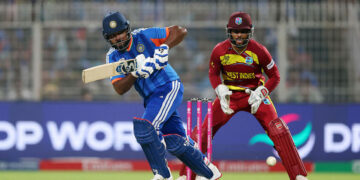
For all Trent Alexander-Arnold’s vaulting ambition, there was always a danger that leaving Liverpool for Real Madrid could backfire.
The 26-year-old said last year that he hoped to become “the greatest right-back to have played football” and the first player in his position to win the Ballon d’Or. Aspirations do not come much higher than that, and when Alexander-Arnold called time on his Anfield career last season, it was clear he saw a move to Madrid as the best way to nurture his dreams.
Three months later, it already seems he may have made a horrible miscalculation.
Alexander-Arnold’s La Liga debut earlier this month against Osasuna lasted barely an hour before he gave way to the returning Dani Carvajal, who subsequently reclaimed his place in the starting line-up for the ensuing trip to Real Oviedo. Now the England international has likewise been dropped by Thomas Tuchel, who has omitted him from his squad for the forthcoming World Cup qualifiers against Andorra and Serbia.
Was Trent Alexander-Arnold right to leave Liverpool?
It is, of course, too early to pass judgment on the wisdom or otherwise of Alexander-Arnold’s move. Only time will tell if his decision to leave Liverpool was the right one. What we can say is that his talent is as undeniable as the allure of the Bernabéu, a stage to which few are called – and which fewer still decline. Even so, it would not have taken a soothsayer to see Alexander-Arnold’s present predicament coming.
Carvajal, a serial winner with Madrid whose accolades include four league titles and six Champions League winners’ medals, was never going to cede his place in the first XI without a fight, even at the age of 33. As captain of the Spanish national team and a Madrid institution, he commands the respect of the dressing room in a way that no outsider ever could.
‘Not so much emphasis on the defensive discipline and effort’
As for Tuchel, he is merely the latest observer to express reservations about the full-back’s defensive work.
“I can see that sometimes he relies heavily on his offensive contributions and gives not so much emphasis on the defensive discipline and effort,” the German said in May. “This major impact that he had for Liverpool over so many years… if he wants to have this impact in the English national team then he has to take the defensive part very, very seriously.”
Beyond the debate about Alexander-Arnold’s defensive prowess, the interesting thing here was Tuchel’s allusion to his impact for Liverpool, and the implication that the full-back has been unable to replicate it at international level. His words brought to mind a similarly controversial move from Anfield to La Liga: namely, Philippe Coutinho’s £142m switch from Liverpool to Barcelona in 2018.
An instructive comparison
While the circumstances of the two transfers differed – not least because, unlike the Brazilian, Alexander-Arnold ran down his contract rather than agitating for a move – the comparison, in terms of impact, is nonetheless instructive.
At Liverpool, both players benefited from Jürgen Klopp’ willingness to accommodate the unique nature of their talents. Both posed tactical conundrums that Klopp was willing to solve for the greater good. In Coutinho’s case, that meant adjusting his preferred system to accommodate a No 10; with Alexander-Arnold, it involved a trade-off between creativity and defensive steel.
But those conditions were never likely to be replicated in Spain. Coutinho was not a natural stylistic fit for a Barcelona side already blessed with a magical playmaker in Lionel Messi, while Alexander-Arnold lacks Carvajal’s defensive instincts, leadership skills and dressing-room heft. That is not to say his sojourn in the Spanish capital will unfold along similar lines to Coutinho’s time in Catalonia – but neither is it a precedent that should be ignored.
Alexander-Arnold left Liverpool to challenge himself; the magnitude of the test that lies ahead may be greater than he ever imagined.





































